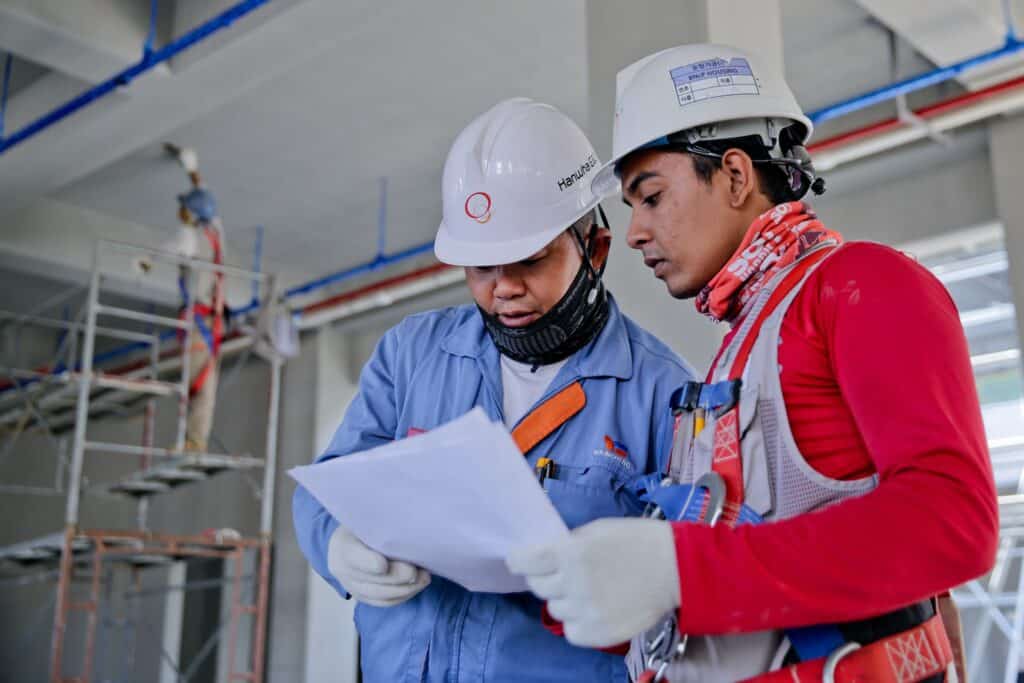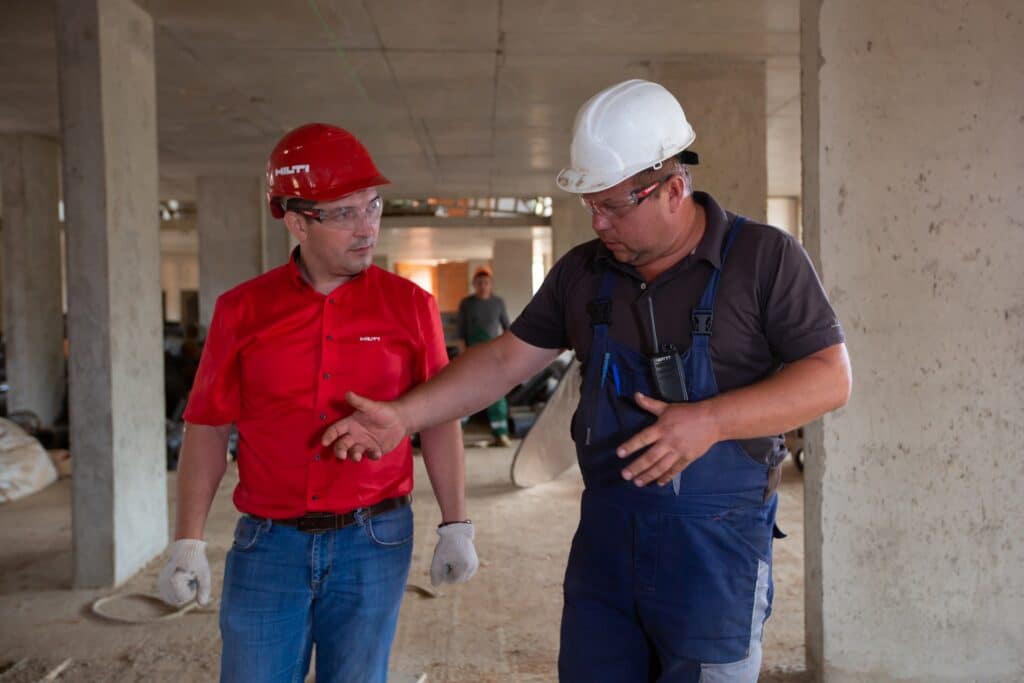Construction workers are the foundational pillars of any construction company, without their contribution and hard work none of act of building would be completed by itself.
In this blog, we embark on a journey tailored for recruiters seeking to navigate the intricacies of hiring construction workers. From comprehending the distinctive needs of the construction industry to crafting an ideal worker profile, we explore a myriad of strategies and techniques that lead to assembling a proficient and cohesive construction team. We delve into the world of safety training, the art of effective interviewing, and the significance of verifying experience. We also uncover the potential of job boards and networks as valuable recruitment tools. Moreover, we underscore the critical role of onboarding and shed light on the key factors that contribute to retaining quality construction workers.
So, whether you’re a seasoned recruiter seeking to refine your approach or a newcomer stepping into the construction realm, join us as we unravel the intricacies of hiring and nurturing the individuals who lay the very groundwork of our modern world.
Understanding the construction industry’s needs
In the dynamic realm of construction, effective recruitment hinges upon a profound understanding of the industry’s distinctive requirements. Recruiters tasked with hiring construction workers must grasp the intricate interplay of factors that define this sector.
Construction is a multifaceted field encompassing various disciplines, each demanding specific skills and attributes. From skilled tradespeople like carpenters, electricians, and masons, to project managers and engineers, the diversity within construction roles demands tailored recruitment strategies. Recruiters should be well-versed in recognizing the technical competencies, safety protocols, and certifications that align with the various roles.
Furthermore, construction is often synonymous with physically demanding work in challenging environments. Therefore, recruiters need to discern candidates’ physical fitness levels and their ability to cope with strenuous tasks. Familiarity with industry-specific jargon and understanding the nuances of construction projects can also facilitate effective communication with potential hires.
In this blog post, we delve into the intricacies of the construction industry’s requirements, equipping recruiters with insights to make informed decisions. From the essential technical proficiencies to the significance of adaptability in unpredictable construction settings, we explore the dimensions that recruiters should comprehend. By immersing themselves in the construction industry’s needs, recruiters can not only source the right talent but also foster a workforce that excels in meeting the industry’s challenges head-on.
Skills and qualities to look for
Crafting a proficient construction team begins with identifying the quintessential traits and proficiencies that define an ideal construction worker. These individuals are the backbone of any successful project, embodying a unique blend of technical skills, personal qualities, and adaptability.
First and foremost, technical expertise is paramount. Adeptness in areas such as carpentry, masonry, plumbing, electrical work, and heavy machinery operation is non-negotiable. The ability to interpret blueprints, adhere to safety protocols, and apply advanced construction methods also sets exceptional candidates apart.
Moreover, an ideal construction worker possesses a robust work ethic and an unwavering commitment to quality. The construction environment demands diligence, punctuality, and the capacity to maintain precision under pressure. Communication skills are equally vital, as construction projects thrive on effective collaboration between team members, contractors, and clients.
Adaptability is a hallmark of successful construction workers. They must navigate diverse challenges, from weather fluctuations to unforeseen on-site issues, all while staying focused on project objectives. Problem-solving skills and a proactive approach to troubleshooting are invaluable assets.
In essence, the ideal construction worker is a harmonious fusion of technical prowess, integrity, adaptability, and a collaborative spirit. By recognizing and nurturing these qualities, recruiters can assemble teams that not only construct buildings but also construct success.
The importance of safety training and certifications
In the construction industry, safety isn’t just a priority—it’s an imperative. Ensuring the well-being of construction workers and minimizing on-site risks requires a comprehensive approach that revolves around safety training and certifications.
Construction sites are inherently hazardous environments, with a multitude of potential risks ranging from heavy machinery operation to working at heights. Safety training equips workers with the knowledge and skills needed to identify hazards, adhere to safety protocols, and respond effectively to emergencies. This training isn’t just about compliance; it’s about safeguarding lives.
Certifications serve as concrete proof of a worker’s competence in specific areas, such as operating cranes, handling hazardous materials, or working with electrical systems. These certifications validate that individuals have undergone rigorous training and assessment to ensure they are qualified to perform tasks safely.
By prioritizing safety training and certifications during the hiring process, recruiters demonstrate their commitment to maintaining a secure work environment. Additionally, companies with a strong safety culture often attract skilled workers who value their well-being. This approach not only reduces accidents and injuries but also enhances productivity and project efficiency.
In conclusion, the construction industry’s emphasis on safety is a testament to its dedication to worker welfare. Incorporating safety training and certifications into the hiring process reinforces this commitment and sets the stage for successful projects built on a foundation of security and professionalism.

Utilizing job boards and construction networks
In the digital age, finding exceptional construction talent involves harnessing the power of job boards and construction networks. These platforms offer recruiters a targeted approach to sourcing the best candidates, streamlining the hiring process, and connecting with professionals who are passionate about their craft.
Job boards dedicated to the construction industry provide a centralized hub where recruiters can post job openings and reach a vast pool of candidates actively seeking opportunities. From skilled trades to project management roles, these boards allow recruiters to tailor their listings to attract candidates with the right expertise and experience.
Construction networks, both online and offline, facilitate connections between industry professionals, creating a space for knowledge-sharing, collaboration, and potential recruitment. Online forums and social media groups specifically designed for construction workers and professionals enable recruiters to engage directly with potential candidates who are already invested in the industry.
Combining the reach of job boards with the targeted engagement of construction networks can significantly enhance a recruiter’s ability to find the best talent. It’s crucial to create compelling job descriptions that highlight the unique opportunities your projects offer and to actively participate in relevant online communities to build relationships.
Incorporating these modern recruitment tools into your strategy not only widens your talent pool but also cultivates relationships with candidates who are aligned with the construction industry’s demands and aspirations.
Interview techniques for construction workers
Interviewing prospective construction workers demands a nuanced approach that delves beyond surface qualifications apart from a construction assessment. Effective interview techniques not only assess technical skills but also uncover the qualities that contribute to a successful construction team member.
Begin by asking about their hands-on experience. Inquire about specific projects they’ve worked on, the roles they’ve played, and the challenges they’ve overcome. This provides insight into their real-world application of skills.
Probe into their understanding of safety protocols. Ask about instances where they’ve encountered safety issues and how they resolved them. A strong commitment to safety is crucial in the construction industry.
Inquire about their adaptability and problem-solving skills. Construction sites are dynamic, often requiring quick thinking and on-the-fly adjustments. Ask for examples of situations where they had to adapt to changes or solve unexpected issues.
Assess their teamwork and communication abilities. Construction projects involve collaboration among various roles. Ask how they’ve coordinated with colleagues, communicated progress, and resolved conflicts on past projects.
Watch out for inflated claims without substance. Ensure their responses are backed by specific examples and details. Be cautious of candidates who lack humility or demonstrate an inability to learn from mistakes.
By utilizing these interview techniques, recruiters can dig deep into a candidate’s practical expertise, personal qualities, and alignment with the demanding yet rewarding construction industry.
Verifying experience and references
In the process of hiring construction workers, one crucial step stands between a promising candidate and a valuable team member: verifying experience and references. This phase is paramount to confirming the authenticity of a candidate’s claims and assessing their competence to contribute effectively to construction projects.
Begin by meticulously reviewing their work history. Look for consistency in roles, companies, and project types. Discrepancies or frequent job changes could be red flags, prompting the need for further clarification.
Reach out to their provided references. These firsthand accounts from past employers or colleagues offer invaluable insights into the candidate’s work ethic, teamwork skills, and overall performance. Ask probing questions about their contributions, problem-solving abilities, and interactions with teammates.
Cross-reference their stated experience with their references’ accounts. This not only verifies the candidate’s authenticity but also provides a comprehensive view of their strengths and areas for improvement.
Be attentive to any hesitations or vague responses from references. While some information might be confidential, consistent and positive feedback can indicate a reliable and capable candidate.
Verifying experience and references is more than a formality—it’s a crucial process that ensures your construction team is composed of individuals who can deliver on their promises, collaborate effectively, and enhance the overall success of your projects.
Setting up new hires for success in the construction world
The journey of a new construction worker begins well before they step foot on the worksite. Effective onboarding plays a pivotal role in acclimating them to the construction world, equipping them with the tools, knowledge, and confidence needed to thrive in this dynamic industry.
Onboarding for construction workers involves more than just paperwork; it’s an immersive process that introduces them to the company culture, safety protocols, and the intricacies of their specific roles. Safety training is paramount, as it establishes a culture of precaution and reinforces the importance of adhering to industry regulations.
Moreover, onboarding provides an opportunity to align new hires with the company’s values and expectations. This fosters a sense of belonging and a shared commitment to the organization’s mission.
Introduce new hires to the team and their roles gradually, allowing them to gain hands-on experience while under the guidance of experienced colleagues. This approach not only enhances their technical skills but also encourages camaraderie and collaboration.
The role of onboarding extends beyond the initial days. Regular check-ins, skill assessments, and opportunities for continuous learning further support their growth within the construction world.
In essence, onboarding sets the stage for a new construction worker’s success. By investing time and effort into their assimilation, recruiters and companies lay the foundation for a capable, safety-conscious, and dedicated workforce ready to make meaningful contributions to the industry.

Benefits, training, and opportunities to consider
Securing skilled construction workers is only the first step; retaining them is equally crucial for sustained success. A comprehensive approach to retention involves recognizing their value, providing ongoing training, and offering growth opportunities that resonate with their aspirations.
Quality construction workers are an asset to any team, and recognizing their contributions is essential. Competitive compensation, performance bonuses, and recognition programs demonstrate that their hard work is acknowledged and appreciated.
Investing in training is a direct investment in retention. Continuous skill development not only enhances their capabilities but also signals that the company is committed to their professional growth. This can include safety certifications, advanced skills training, and leadership development programs.
Opportunities for career advancement and growth are potent retention tools. Providing a clear path for promotion, mentoring, and exposure to new challenges can keep construction workers engaged and motivated to contribute their best.
Creating a supportive work environment is paramount. Open communication channels, feedback mechanisms, and a culture that prioritizes work-life balance contribute to job satisfaction and longevity.
In conclusion, retaining quality construction workers requires a holistic strategy that combines fair compensation, training opportunities, and the promise of growth. By fostering a workplace where their skills are honed, their efforts are valued, and their aspirations are nurtured, companies can create a loyal and proficient construction workforce ready to build a lasting legacy.
Conclusion
In the symphony of construction, where each note strikes a chord of progress, the harmonious blend of skill, dedication, and ingenuity is what gives rise to marvels. Through the lens of a recruiter, the journey of hiring construction workers emerges as an art that blends precision and intuition. From understanding the industry’s unique demands to recognizing the traits that define an ideal worker, the path to success begins with a foundation of knowledge.
Safety training, thoughtful interviewing, experience verification—these facets are the stepping stones that bridge the aspirations of candidates with the expectations of the construction world. The role of job boards, networks, and onboarding is pivotal in shaping the workforce, while retention hinges upon a symphony of benefits, growth opportunities, and a nurturing environment.
As we draw the curtain on this discourse, let us remember that the recruitment of construction workers isn’t just about filling positions; it’s about weaving together a tapestry of talent that elevates projects and propels the industry forward. With each construction worker, a chapter unfolds—a chapter filled with the sweat, the dedication, and the stories that continue to shape the urban landscapes we inhabit.
Testlify offers a range of assessments and challenges that allow you to gauge candidates’ knowledge, problem-solving skills, and creativity in real-world scenarios. With Testlify, you can administer real-world challenges that simulate the actual assessment process, giving candidates the opportunity to showcase their skills and approach. The platform provides a structured and standardized assessment process, allowing you to compare candidates objectively and make informed decisions. By incorporating Testlify into your hiring process, you can ensure a more comprehensive and reliable evaluation of candidates, ultimately helping you identify the most qualified individuals for your team.
With our extensive test library, you can objectively evaluate candidates’ abilities, ensuring you shortlist the most talented individuals efficiently. Ready to unlock the potential of your hiring process? Book a free 30-minute live demo with Testlify. Our expert team will guide you through the platform, showcasing relevant skill tests tailored to your organization’s needs. With our support, you can streamline candidate selection, saving valuable time and resources.







